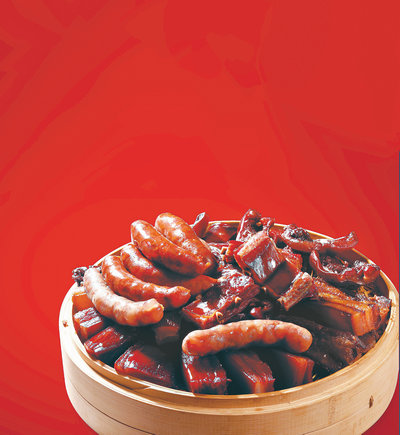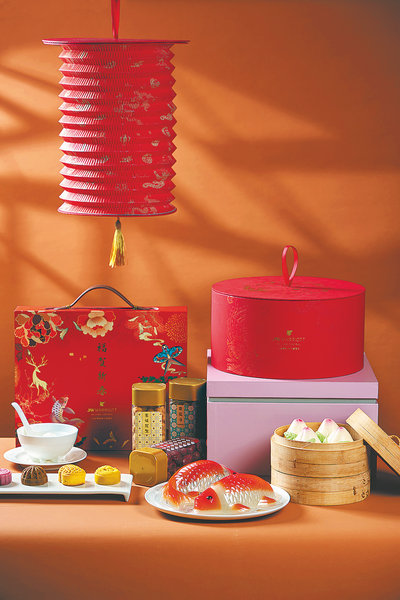A traditional feast's new tastes


As people born after 1995 come to set the Spring Festival menu, they're serving novel flavors, and more dishes from other regions and countries, Li Yingxue reports.
Larou, a type of cured meat, is an essential Chinese New Year's ingredient for people in Sichuan province, for whom it represents not just a festive tradition, but also the taste of home.
For those who've experienced the enchantment of a Sichuan winter, it's a season painted with the rich hues of smoky aromas — imagine cypress branches being used to ignite a bonfire, as tendrils of smoke gracefully envelop the cherished larou sausages.
In Beijing, the Meizhoudongpo restaurant chain, which is known for Sichuan cuisine, is offering diners a taste of authentic larou. Its annual larou offering, savored only once a year during the Spring Festival season, has long been loved by customers.
This year, the chain has upgraded its larou production by selecting the black pigs used in the meat's making, according to Zhou Miao, general manager of the chain's brand marketing center.
"Every year, many loyal customers eagerly await the release of our Chinese New Year goods. As soon as the larou products hit the market, we receive numerous orders," Zhou says.
As the Year of the Dragon approaches, the sale of Lunar New Year goods and especially food is brimming with festive spirit across the country. Gift packages and boxes with unique features are selling like hot cakes, with the post-1995 generation taking the lead in family Spring Festival shopping, driving a surge in online sales.
Restaurants and food merchants from different regions are striking a balance between tradition and innovation, providing customers with a mix of traditionally rich-flavored New Year goods and unique creative options, catering to the changing tastes of the market.
According to Zhou, Meizhoudongpo has been making Chinese New Year goods for more than a decade, and preparation of this year's larou offerings commenced as early as September. In addition to cured sausages, they include cured spareribs, pork belly, and a type of chicken that undergoes a distinctive air-drying process.
Elaborating on the meticulous 28-day process their larou undergoes, Zhou says that the fresh meat receives a spa-like rub with Sichuan peppercorns and salt. It then airdries for five days, undergoes smoking with fruitwood, and then continues to air dry in the sun. After this journey, the larou emerges with a glossy appearance, crystal-clear texture, and the subtle fragrance of fruitwood. It can be enjoyed steamed, stir-fried, or stewed, making it an indispensable New Year flavor for Sichuan people, Zhou says.
"Unlike traditional outdoor household production, we take a centralized factory approach. However, we meticulously replicate the temperature and humidity of Sichuan during December of the lunar calendar to ensure the quality of our larou. This way, the weather doesn't compromise the final taste," explains Zhou.
For the coming Year of the Dragon, Man Ho Restaurant in Beijing has rolled out a variety of Chinese New Year gift boxes. According to Dong Yan, the restaurant manager, this year's offerings include a diverse range of traditional New Year goods like pastries, rice cakes, sweet dumplings, braised items, and poon choi, along with stylish gift baskets.
"Poon choi, a traditional Cantonese dish, is in high demand, with many people choosing it as the main dish for their reunion dinner. It symbolizes joy and abundance, like a treasure trove," explains Dong.
"Another reason is because preparing poon choi is complex and time-consuming. Many families find it inconvenient to make themselves, so they buy it ready-made."

Dong also highlights the carp-shaped rice cake, a traditional delicacy made by their restaurant every year. The symbolic dish, representing surplus, is a household staple. "Traditionally, it's steamed, but we also suggest pan-frying for a unique flavor," Dong suggests.
The restaurant has also added Chinese-style snacks to the rice cake gift box, each with an auspicious name like "Good Things Happen "or "Prosperity in the Year of the Dragon".




































